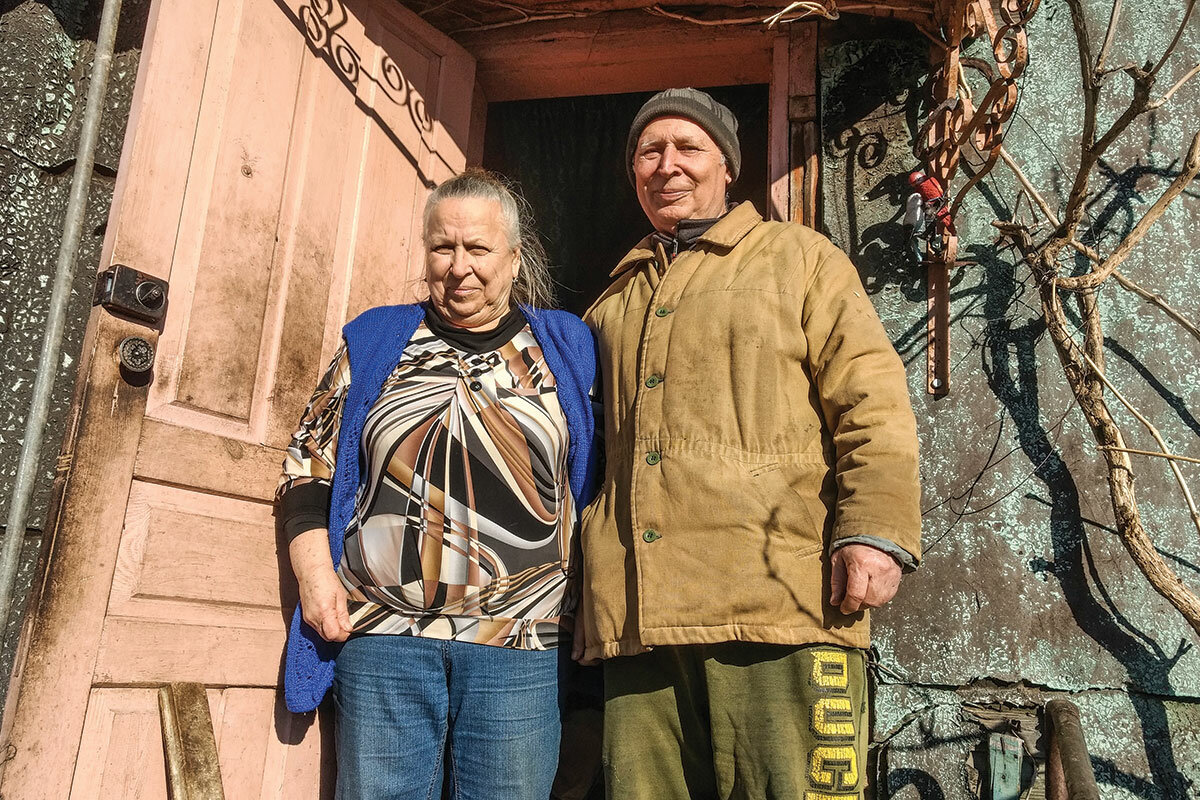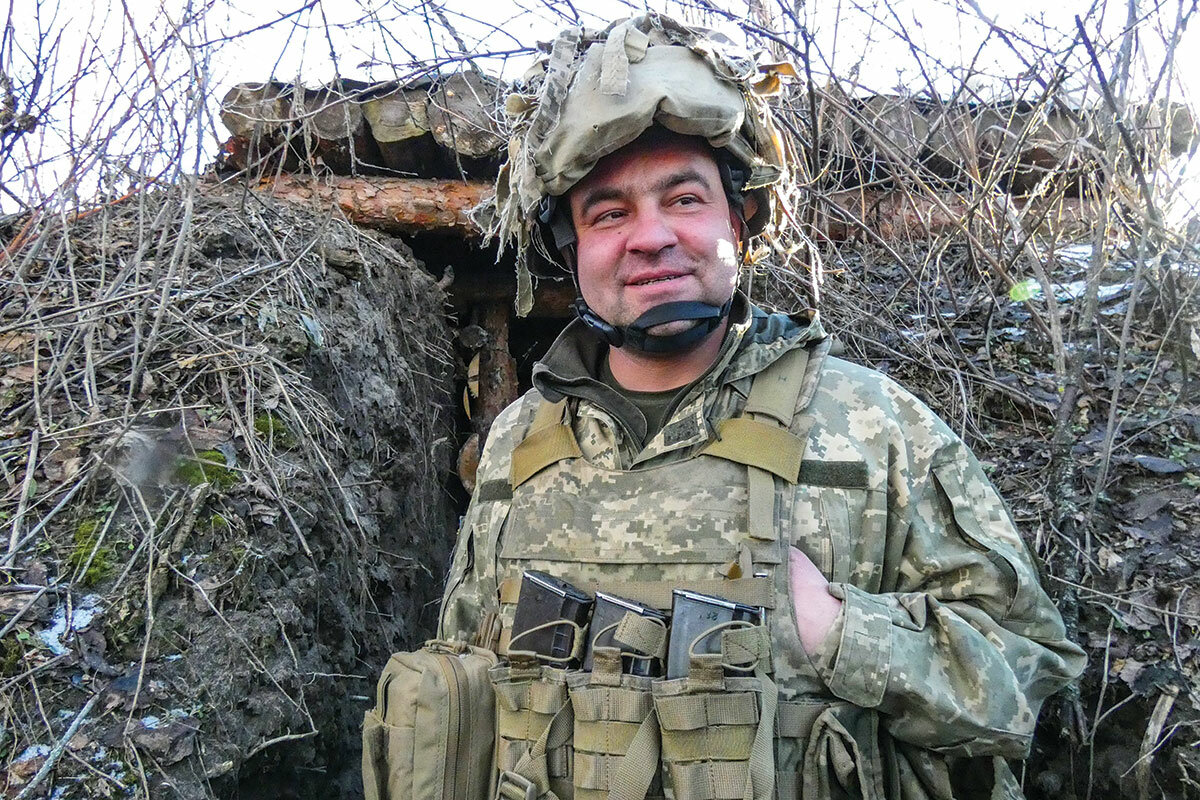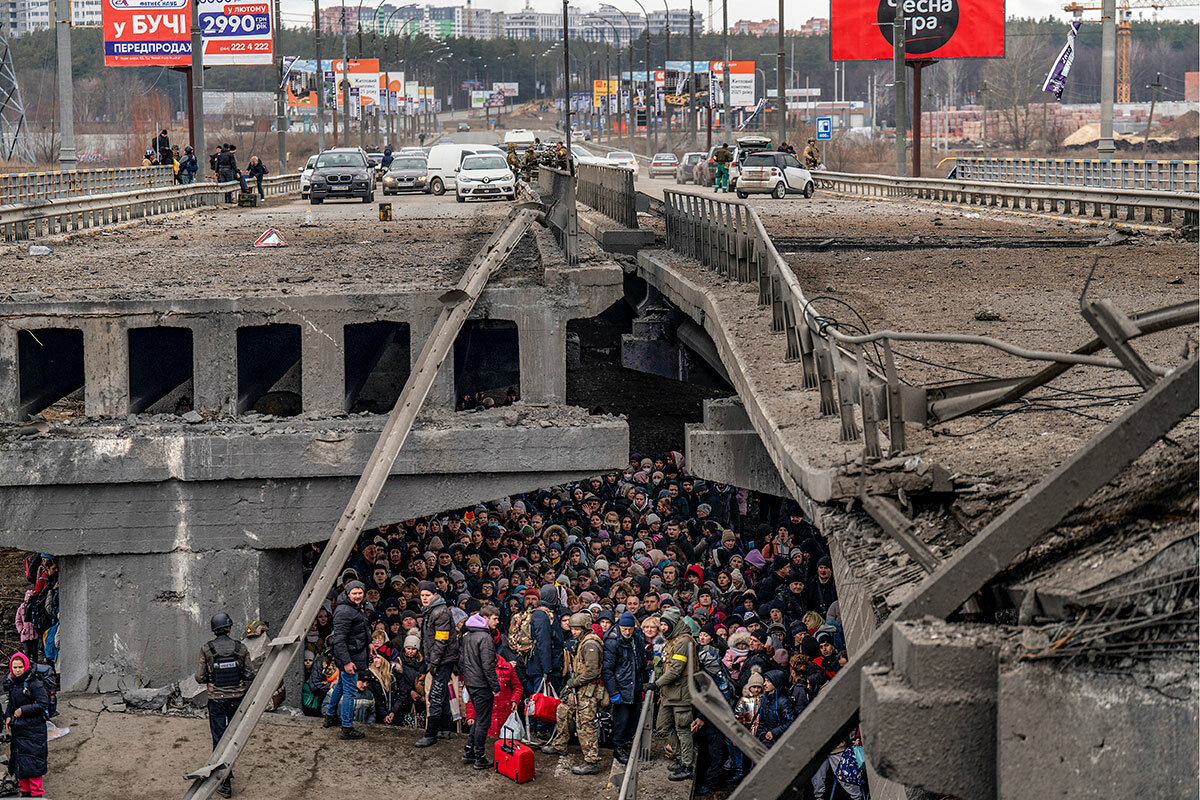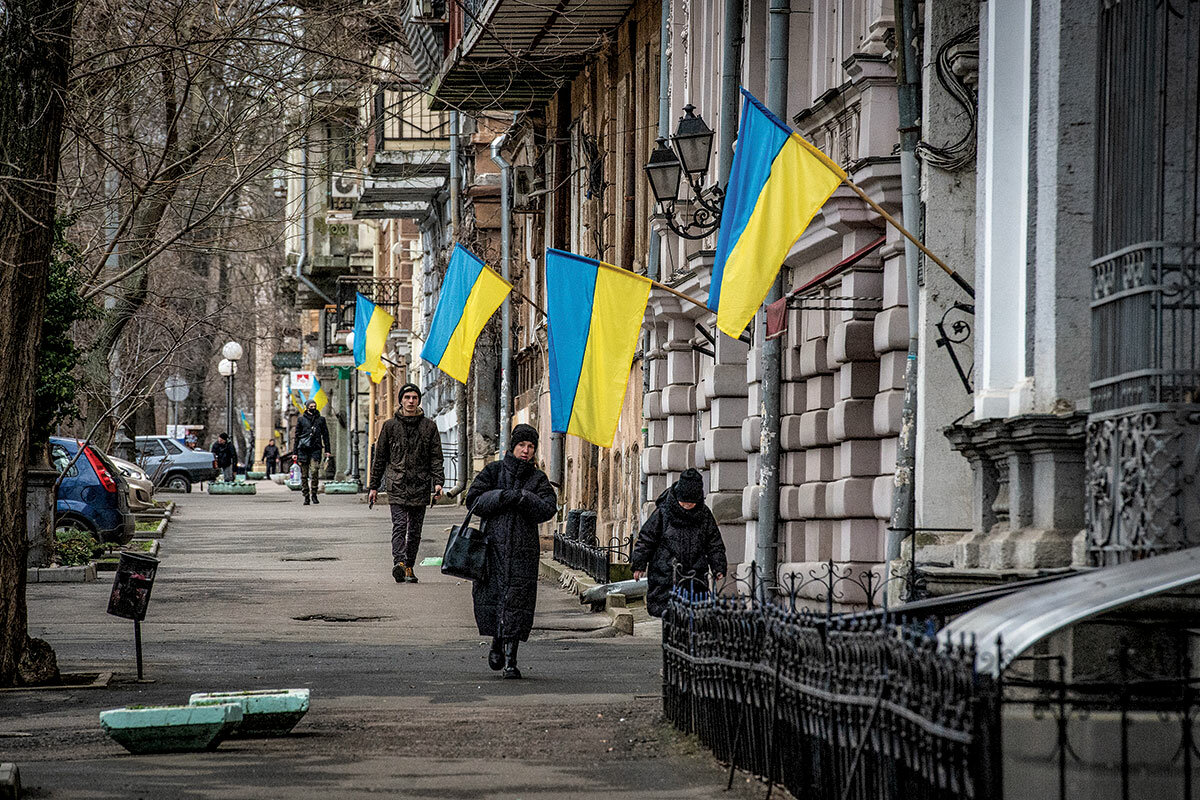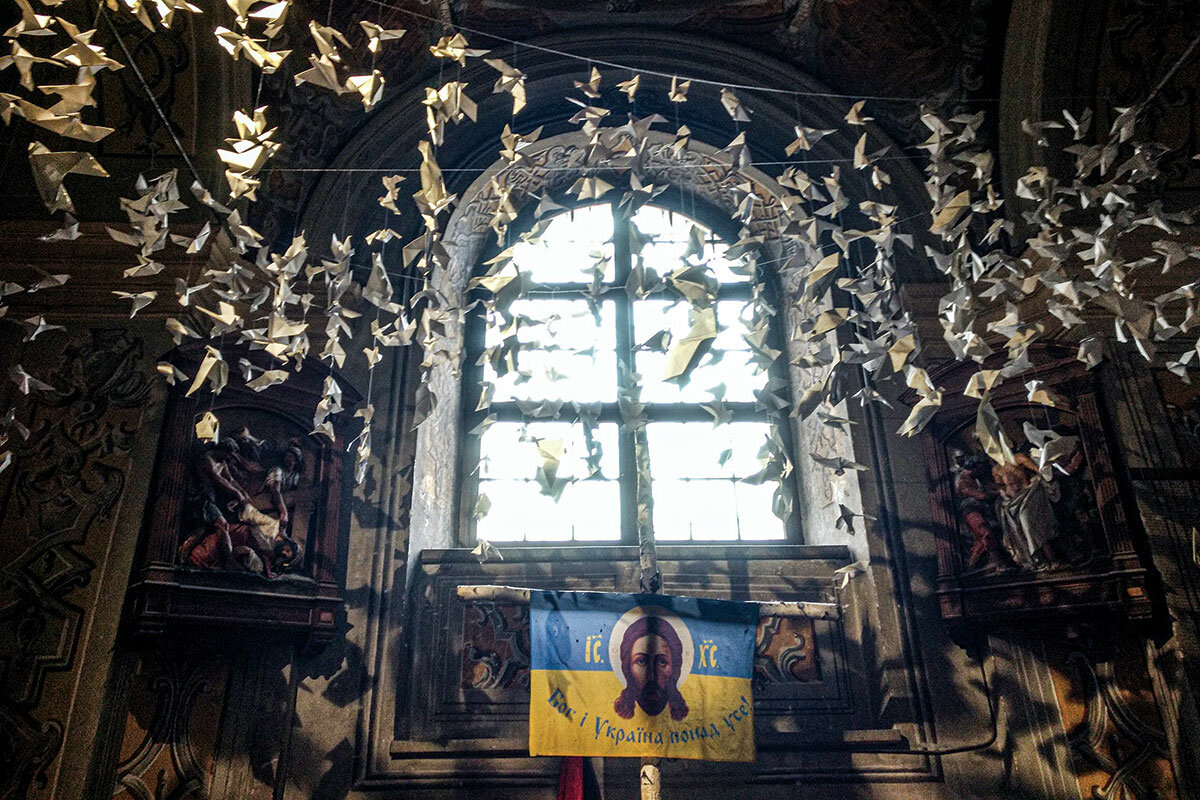Notes from a war: Resilience and anguish in a Ukraine under siege
Loading...
| Syze, Ukraine
A hum rose from the white wooden box as Yuri Andriyovich lifted its lid to reveal a colony of bees. Workers moved in a swirl along the honeycomb they had built, forgoing the chance to escape for the routines of a captive existence.
Before war came to Yuri’s village in eastern Ukraine, he would drive 15 miles to sell his honey at the market. The trips ended in 2014 when rockets and Russian-backed militants descended on Syze, where the retired police officer and his wife had lived for more than 40 years. He and his wife refused to flee. He found a different market, even though honey sales dipped.
Why We Wrote This
Amid the devastation of war, our reporter has been moved by the resilience, courage, and resolve he has encountered in Ukraine.
The devastation that Russian forces inflicted in the east – and the defiance of the region’s people – prefigured what occurred when the larger war erupted as I traveled from the Donbas to Kyiv to the western city of Lviv. My mind fixated on my late father, a Lviv native whose bond with his country held fast amid his separation from its soil during the last 70 years of his life.
I have been struck by the compassion shown by strangers, even in the scrum to escape, giving up train seats to mothers and children, helping older people up or down stairs. But I am unsurprised by the country’s unbending resolve. If I learned anything from my father, it is this: Ukraine will fight. And Ukraine will love.
A gentle hum rose from the white wooden box as Yuri Andriyovich lifted its lid to reveal a colony of bees. Near the top, worker bees moved in a swirl along the honeycomb they had built, forgoing the chance to escape for the routines of a captive existence.
Eight years ago, before war came to Yuri’s village in eastern Ukraine, he would drive 15 miles to Luhansk, a city of 400,000 people, to sell his honey in jars the size of footballs. The trips ended in 2014 when rockets and Russian-backed militants descended on Syze, where the retired police officer and his wife, Lydia, had lived for more than 40 years in a one-bedroom home.
The village’s dozen other residents escaped to safety. The couple stayed as separatist and Ukrainian forces battled through 2014 and deep into the next year in the southern reaches of the Donbas, the collective name for the adjacent Luhansk and Donetsk regions.
Why We Wrote This
Amid the devastation of war, our reporter has been moved by the resilience, courage, and resolve he has encountered in Ukraine.
The fighting ebbed in the ensuing years but never ceased. Some 3,400 civilians died and 1.5 million people fled across a broken, battered landscape. In Syze, 2 miles from Russia, weeds grew as tall as ceilings inside empty houses split apart by shelling.
Yuri and Lydia adapted to the confines of war rather than leave the life they knew. They seldom went elsewhere and almost no one visited. The city of Luhansk fell within the territory held by separatists, so Yuri brought his honey to a nearby town still under Ukrainian control, braving a road with more holes than asphalt in his rusting Lada. Most often he returned with several jars unsold.
Still, tending to bees busied his mind, and in recent months, the work had provided respite from the reports of a possible Russian invasion. He replaced the lid on the beehive and pulled off his knit cap, running a callused hand over his bald head and then down his broad, open face. The beekeeper stood beneath a bright blue sky and the cloud of an eight-year war.
“What will happen?” he asked. “Only God knows.”
I met the Andriyovichs a week before Russian President Vladimir Putin sent troops and tanks pouring over the border Feb. 24. Syze was one of the dozens of villages and towns along the 260-mile front line that formed a jagged scar across the southern Donbas. Now much of Ukraine is the front line and the entire country has been cut open.
The devastation that Russian forces inflicted in the east – and the defiance of the region’s people – prefigured what occurred when the larger war erupted as I traveled from the Donbas to the capital of Kyiv to the western city of Lviv. In those five weeks, as the world witnessed the fierce will and quiet resilience of Ukrainians, I thought again and again of my late father. A Lviv native and World War II survivor, he possessed the same traits and the same love of country, a bond that held fast even with his separation from its soil over the last 70 years of his life.
The residents and soldiers I encountered in the Donbas reacted with stoic readiness to the buildup of 200,000 Russian troops on Ukraine’s border. Eight years of war had conditioned them. In a region where the language and religious practices of Russia prevail, they found humor in the idea that Ukrainians might greet invading forces as liberators.
“I divorced my wife because she was pro-Russian,” Sgt. Serhiy Bachinsky said with a smile.
We stood in a muddy trench near Syze, 250 miles east of his hometown of Zaporizhzhia, and even further removed from his former profession of sports academy instructor. His doughy face and genial disposition called to mind the TV comedian Andy Richter equipped with an armored vest and automatic rifle.
Sergeant Bachinsky volunteered to fight after Russian-backed separatists seized portions of the Donbas in 2014. He soon decided to make the military his career, and as a potential invasion loomed, he offered what sounded less like a prediction than a truth yet to arrive.
“Putin talks about Ukraine being part of Russia,” he said. “We are on our land and we will defend our land.” He smiled again. “If the Russians come, they will see how much we will defend it.”
I stood in ankle-deep mud in another trench about 60 miles away when I met Sgt. Sergihy Buhai two days later. We spoke under the watchful gaze of Mr. Putin, whose frowning image adorned the pillow head of a target dummy clad in flannel and perched on a defensive barrier.
The father of three children, Sergeant Buhai belonged to a unit deployed near the mining town of Zolote, and his time in uniform paralleled Sergeant Bachinsky’s. The start of his service traced to 2014, when fighting in the Donbas exposed Ukrainian forces as unorganized, undertrained, and underfunded. NATO nations responded with increased military aid and training assistance to build the army’s capacity and competence.
Sergeant Buhai insisted that the funding had bought a professional fighting force. “We are not the same army anymore,” he said, leaning against a blue and yellow Ukrainian flag nailed to a bunker wall. He appeared unmoved by the sporadic thump of incoming artillery and mortar rounds hitting wet earth in our vicinity. “This time it won’t be us who is surprised.”
I recalled his calm assurance as I rode a train to Kyiv that evening. The fitful shelling had reminded me of the discordant sounds inside a symphony hall when orchestra musicians warm up before a concert. The random noises precede a cohesive performance, and as mothers cradled infants and couples held hands in the car around me, I wondered if I had heard Russian soldiers tuning the terrible instruments of war.
An untroubled air pervaded Kyiv in the days before Feb. 24. People filled malls and cafes, health clubs and nightclubs. Families and couples walked through parks and plazas. Workers and students sat at their desks. Cars clogged streets and trains ran on time.
The common theories in the city of 3 million residents about Mr. Putin’s intentions mirrored the prognoses of Western analysts and journalists. Most assumed the invasion would never come or would focus on the Donbas and perhaps port cities on the Black Sea and Sea of Azov.
For those in the capital, the war in the east had receded toward the horizon. Their apathy derived, in part, from the passage of time and a lack of proximity. Ukraine is about the size of Texas, and the distance from Kyiv to Luhansk – more than 500 miles – is roughly that of Dallas to the border town of Brownsville. It seemed a world apart.
The invasion’s first 24 hours ruptured the illusion of remoteness. The thunder of missile strikes and a sustained artillery battle on Kyiv’s outskirts gave sound and shape to a violent new reality. The war was here.
Black smoke rose from rocket attacks as air raid sirens blared. The cafes and shops and schools closed. Lines snaked out of pharmacies, and customers emptied shelves at any grocery store that remained open. As ATMs ran dry, customer receipts collected on the ground, the confetti of the desperate.
Traffic disappeared from the streets except for the main avenue leading west out of the city and away from the country’s heaviest fighting. Many who chose to stay moved underground. They brought blankets and sleeping bags into subway tunnels and parking garages, taking refuge together from shelling and despair.
Some struggled with the decision to leave. I crossed paths with Natasha Simonova on the invasion’s second day as she walked home after buying fruit and bottled water at a corner grocery. An attorney with an architecture firm, she had pinned a blue and yellow ribbon to her bright green sweater, and she cast her presence in the city in a patriotic light. “We must be strong for Ukraine,” she said, lifting a hand to her heart. “Our country needs every one of us.”
We spoke again four days later by phone. The deepening shadows of war had darkened her outlook. She planned to depart for Lviv by train in the morning. She had lost her bearings. “Before I was a fish in water,” she said. “Now I am a fish in vodka.”
Waves of sudden refugees flowed into Kyiv’s central railway station as the Russian offensive intensified. They had stuffed suitcases and backpacks with the fragments of their abandoned lives. They surged toward any train headed west and begged conductors to let them aboard, straining to be heard above the air raid sirens.
A declaration of martial law from Ukrainian President Volodymyr Zelenskyy required men ages 18 to 60 to remain in the country to fortify its military. His order turned each train’s departure into a wrenching separation. Husbands gave their wives a final kiss, and fathers hugged their children goodbye. When the trains pulled out, few knew if they would hold their loved ones again.
Strangers retained their humanity even in the scrum to escape. Three young women gave up their place in line to allow a mother with two small daughters in matching pink coats to claim seats on a car. Pairs of men and women wrapped their arms under the legs of older people and carried them up and down flights of stairs. Conductors apologized when they had to close car doors and sought to reassure those stranded that more trains would arrive.
The acts of goodwill lingered in my mind after I found a spot on a night train to Lviv. Ukraine’s military and the civilian defense force had supplied the loudest retort to Mr. Putin’s purported belief that Ukrainians would welcome his troops.
But the tacit cooperation of refugees in their moment of flight provided an equal measure of national unity. They had not trampled one another rushing to board trains as artillery shelling echoed in the distance. They recognized their shared dread and reacted with mutual compassion.
The train listed and shuddered along tracks coated with wet snow. Relieved smiles and murmured conversations passed between the wives, mothers, and grandmothers until the hour grew late. The car fell quiet. As they traveled onward in the darkness toward uncertainty, there came the sound of a woman’s hushed crying.
Katya Petrenko sat outside Lviv’s railway station with her two preteen sons and the burden of the unknown. She and two other mothers and their children had endured a 10-hour train ride after fleeing Vinnytsia. The city southwest of Kyiv absorbed heavy shelling as Russian forces targeted the headquarters of the Ukrainian air force command.
The families gathered in the wan light of a bomb shelter as the ground shook from missile strikes. Ms. Petrenko wondered if they had entered a living tomb. “You didn’t know if you were going to come out,” she said. Her husband and those of her friends remained in Vinnytsia as members of the territorial defense force. The women and their eight children intended to take another train to the Polish city of Lublin to stay with a host family.
“I have no idea what we will do after that,” said Ms. Petrenko, a food technologist by training. One of her sons had brought a backpack imprinted with the slogan “Future Is Now” – a cruel taunt as war demolished the familiar contours of life. Her eyes glazed with tears. “Nobody can plan for something like this,” she said. “Nobody thinks they are going to be a refugee.”
The Russian invasion has forced more than 4 million Ukrainians out of the country, and the majority have passed through Lviv on their way to Poland, Romania, and Slovakia. Dubbed “the soul of Ukraine,” and known for its cultural sophistication and historical resistance to Russian influence, the city houses some 200,000 refugees day to day in churches, schools, and other public spaces.
Their sorrow at the prospect of losing their country and their loved ones carried echoes of my father’s experience after World War II. Eugene Kuz, born in Lviv in 1923, grew up in Josef Stalin’s Ukraine, a place of state-imposed famine and scarce hope. He was 17 in 1941 when German forces invaded his homeland, then part of the Soviet Union, and by the time the war ended four years later, he had set foot there for the last time. The Iron Curtain made returning to Ukraine too fraught with risk, and after the Soviet Union later dissolved, declining health prevented him from traveling overseas. He never again saw his parents or brothers. He never forgave Russia.
During my time in Lviv, I visited Ivan Franko Park, named after the Ukrainian poet and political activist born in the region in 1856. I found a newly installed set of wooden stairs leading underground to a bomb shelter that closed after World War II. City officials reopened the space as Russia again laid siege to Ukraine, and running my hand along its old brick walls, I wondered if my father and his family ever huddled here together, waiting for silence.
Lviv’s embrace of hundreds of thousands of strangers during the invasion has revealed the Ukrainian identity as much as the military’s unflinching resistance. A dual willingness to offer succor and take up arms embodies the national character that informs the ministry of the Rev. Roman Mentukh at Sts. Peter and Paul Garrison Church.
Built in the 17th century, and endowed with its original statuary and ceiling murals, the church has provided pastoral care since 2011 to Ukrainian soldiers and their families through the country’s military chaplaincy. Displays along one wall show photos of every service member from the Lviv region killed since the war in the Donbas erupted in 2014. There are hundreds.
I met Mr. Mentukh at the church on Lviv’s central square to ask what guidance he gave his congregation of soldiers and civilians after Russian troops invaded. He pushed his glasses up and smiled. “You don’t know what to tell people,” he said, shaking his head. “It is a very difficult test of my faith.” In the end, after hours of internal debate, he chose to share a simple truth and urged his parishioners to act.
“It is hard to find the peace in our own hearts in this moment,” he told them. “But let each of us take that feeling and do what we can to help our country.”
More photos of fallen soldiers have appeared on the church’s displays since he spoke those words Feb. 24, and the toll of the war on Ukraine’s troops and civilians rises by the day. But I am unsurprised by the country’s unbending resolve to preserve its freedom and its democracy. My father taught me. He died in 2015 at age 92, and if I learned anything from him about the place where he remained a spiritual citizen until his last breath, it is this: Ukraine will fight. And Ukraine will love.






